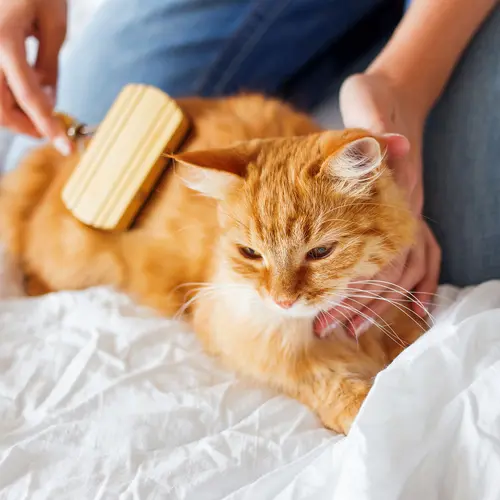Inflammatory bowel disease, or IBD, in cats is a serious, long-term illness. It affects different parts of your cat's digestive system and may even affect all of it. The pancreas and liver can also be affected. It's a lifelong disease and can be debilitating for your companion animal.
Inflammatory Bowel Disease in Cats
Inflammatory bowel disease is characterized by inflammation of the intestines, as the name suggests. The cause is not fully understood. This disease can affect any part of the digestive system, including the stomach, small intestine, and large intestine.
When your cat has IBD, the affected parts of their digestive system are flooded with inflammatory cells. The inflammation causes swelling and damage to the walls and absorptive lining (mucosa) of the intestines. The intestines are then unable to perform their main function of absorbing food, water, and nutrients.
The immune system is involved in this persistent inflammation. It may be caused by your cat's immune system reacting to a foreign substance. Other potential causes include an abnormal response of their immune system to normal components of the intestines (such as normal gut bacteria) or some food.
Altered composition of the intestinal bacteria may also be a contributing factor. Metronidazole and other antibiotics can help reduce the symptoms of inflammatory bowel disease.
Depending on the part of the digestive system involved, IBD in cats may consist of gastritis (inflammation of the stomach), enteritis (inflammation of the small intestine), or colitis (inflammation of the large intestine). Your cat's IBD could also involve multiple parts of their gastrointestinal tract.
What Are The Symptoms of IBD in Cats?
Inflammatory bowel disease is generally seen in middle-aged and old cats. Young cats rarely have this disorder.
The symptoms of IBD depend on which part of the digestive system is involved. Inflammatory bowel disease affecting mainly the stomach and the upper part of the small intestine will cause repeated vomiting and weight loss. On the other hand, IBD which mainly involves the large intestine will cause diarrhea and the presence of mucus and blood in the feces.
Other symptoms seen in cats with IBD include lethargy, reduced appetite, jaundice (a yellowish tinge to the whites of the eyes, often caused by liver disease), and an enlarged liver. Sometimes, your cat may have a vastly increased appetite.
How Is IBD in Cats Diagnosed?
Your veterinarian may order basic blood and fecal tests as well as tests for your cat's liver and pancreatic function. They may also ask for an ultrasound or other imaging to diagnose IBD. However, a definite diagnosis of inflammatory bowel disease can only be made by biopsy, which is taking a piece of the affected tissue and looking at it under a microscope.
Examining the biopsy specimen under a microscope helps in both the diagnosis of IBD in cats and determining how severe the case is. A biopsy will differentiate inflammatory bowel disease from other conditions like endocrine disease, food intolerance, chronic parasitic disease, cancers, and infectious enteritis.
What Is the Treatment for Cat IBD?
Treatment of IBD in cats aims to reduce inflammation. Because the immune system is believed to be involved in IBD, your veterinarian will try to do this in two ways — by removing the antigen that is stimulating your cat's immune system and using drugs to suppress their immune system. The two main pillars of treatment are drugs and a special diet.
Drugs your veterinarian may prescribe include:
- Corticosteroids, for their effective immune system suppression and anti-inflammatory effects
- Metronidazole or Tylosin, for their anti-inflammatory, anti-parasitic, and antibiotic actions
- Potent immunosuppressive drugs like azathioprine and chlorambucil
- Prebiotics and probiotics, which can populate your cat's gut with bacteria that promote gut health
Is There a Good Diet for Cats with IBD?
Food and nutrition are a very important part of the treatment of IBD. You should give your cat food based on a protein that they have not eaten before, or a special hydrolyzed diet in which the protein source is broken down into tiny pieces may be prescribed by your veterinarian. This will eliminate any possibility of allergies. Usual choices are diets based on venison, duck, or rabbit.
Your veterinarian will suggest highly digestible food for your cat. You should look for food with no, or minimal, food additives. Avoid high-fat diets. If your cat's IBD involves the large intestine (colitis), a high-fiber diet may help.
The benefits of diet changes will only be seen after some weeks when the inflammation has had time to subside. During this dietary therapy, make sure to avoid all table scraps, treats, and other food sources.
Is IBD in Cats Life-Threatening?
Sometimes, IBD in cats can’t be controlled. Despite giving them the best treatment available, your companion animal may continue to suffer. Their coat may become dull, they may get thinner, and you may be able to sense they're in pain.
You can help to keep them comfortable by making sure they get proper nutrition and hydration and pain relief.

